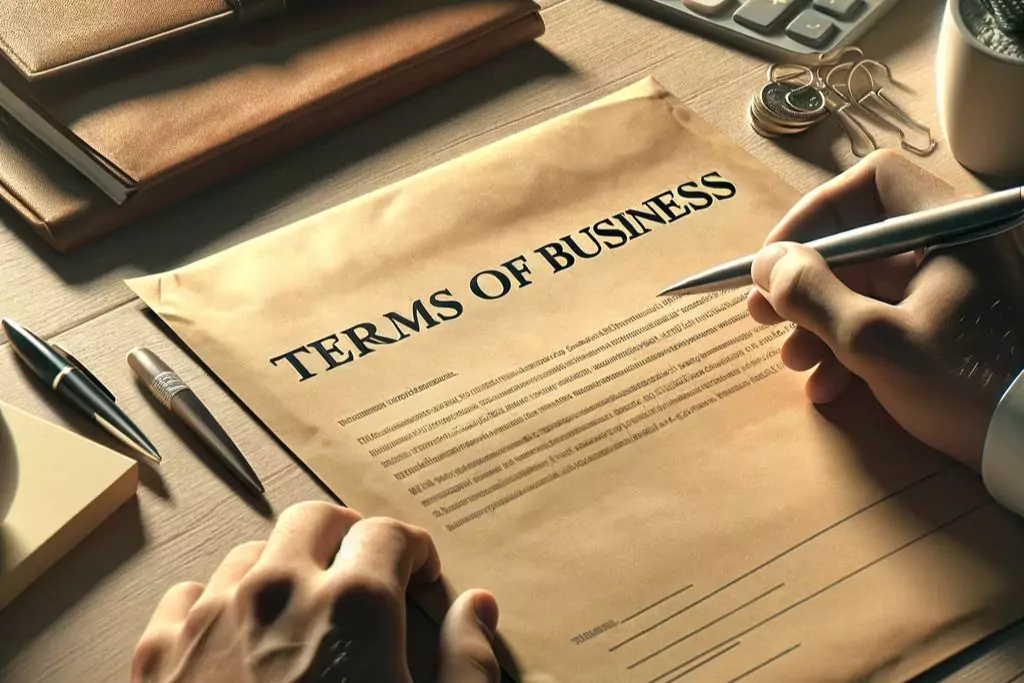Terms of business is a document that outlines the agreed-upon arrangements between you and your customers, covering both the sale of goods and the delivery of services.
Operating without a written agreement can lead to significant problems. Creating your own terms of business, which accurately reflect your business operations, is extremely beneficial.
Here are some of the main benefits of terms of business agreements:
- Clarity
- Legal protection
- Risk management
- Professional image
- Regulatory compliance
What is a terms of business agreement?
A terms of business agreement is a crucial document that outlines the agreement between a business and its customer, whether for selling goods or providing services. These terms lay the foundation for your relationship with your customer and should be clear, straightforward, and easy to understand. They should detail the agreed services or goods, delivery expectations, and procedures for unforeseen circumstances.
Do I need terms of business?
Incorporating terms of business into your business contracts is essential for conducting business on your terms. Without them, you lack a written reference in case of future disputes, potentially leading to prolonged and costly disagreements. A well-defined set of terms of business not only elevates the professionalism of your dealings but also safeguards your reputation.
What’s included in standard terms of business?
The content of your terms of business will vary depending on the nature of your business, but standard components should include:
Description of goods or services: Clearly define the goods you’re selling or the services you are providing.
Pricing details: Include information on possible price variations, communication methods for these changes, and relevant contract clauses for price increases.
Payment terms: Specify preferred payment methods, payment deadlines, and the repercussions of late or non-payments.
Delivery and insurance: Outline the point at which the customer becomes responsible for the goods.
Service delivery specifics: Detail operational elements like staffing and service levels, particularly important in service contracts such as cleaning.
Representations and warranties: Verify the authenticity of the customer, their authority to conduct business, and compliance with legal obligations.
Liability clause: Limit your liability concerning inadequate goods or unsatisfactory services, covering situations like misuse of goods by customers or issues preventing service delivery.
Confidentiality provisions: Safeguard intellectual property and regulate its usage.
Assignment clauses: Address situations involving business sales or the possibility of assigning the contract to subsidiaries.
Termination conditions: Set out the duration of the contract, reasons for termination, required notice periods, the impact on unfinished services or goods not yet delivered, and any charges for early termination.
Data protection and legal compliance: Ensure conformity with data protection laws and other relevant statutory requirements, such as consumer rights.
Dispute resolution procedures: Establish a clear process for addressing any disagreements that might occur.
When do I need a lawyer?
When you’re operating without terms of business and suddenly find yourself dealing with a customer, the situation can become complex. It’s common to consider using a standard version of terms of business from another source. However, while these standard documents may appear adequate, they often fail to capture the specific nuances and requirements of your unique business. Customising your terms of business is crucial, as it ensures that all essential and specific details of your operation are properly addressed.
For professional and tailored assistance in drafting, negotiating, or reviewing your business’s terms, our commercial law solicitors are at your service, equipped to provide the expertise needed to ensure your terms are legally robust and specific to your business needs.
Please get in touch if you need legal advice:
0117 435 4350


